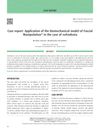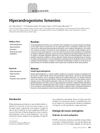 June 2021 in “Health and Society”
June 2021 in “Health and Society” Healthy lifestyle changes, especially weight loss, can improve symptoms and overall health in people with Polycystic Ovary Syndrome, especially if they are overweight or obese.
 August 2021 in “Pelviperineology”
August 2021 in “Pelviperineology” Fascial Manipulation treatment helped a woman with vulvodynia and other health issues.
 11 citations,
January 2016 in “Journal of clinical & experimental dermatology research”
11 citations,
January 2016 in “Journal of clinical & experimental dermatology research” Substance abuse can cause various skin problems, including marks from injections, sores, premature aging, and increased cancer risk.
 May 2016 in “Endocrine Abstracts”
May 2016 in “Endocrine Abstracts” The removal of the adrenal tumor improved the patient's symptoms and reduced androgen levels, indicating successful surgery.
 1 citations,
June 2021 in “Journal of gynecology and womens health”
1 citations,
June 2021 in “Journal of gynecology and womens health” The study found that PCOS affects about 6.5-6.8% of women in both urban and rural areas of Telangana, India, and highlighted the importance of lifestyle changes for management.
 April 2023 in “Elsevier eBooks”
April 2023 in “Elsevier eBooks” PCOS is a hormonal disorder causing symptoms like excess hair, acne, irregular periods, and fertility issues.
 60 citations,
October 2014 in “Journal of the American Academy of Dermatology”
60 citations,
October 2014 in “Journal of the American Academy of Dermatology” Dermatologists play a key role in treating skin symptoms of PCOS like dark patches, excess hair, acne, and hair loss.
 November 2022 in “Journal of the Endocrine Society”
November 2022 in “Journal of the Endocrine Society” A 21-year-old male with a rare genetic disorder experienced sudden hair loss and high DHEAS levels, likely due to a condition similar to PCOS, usually seen in women.
 2 citations,
April 2021 in “Reproductive health of woman”
2 citations,
April 2021 in “Reproductive health of woman” Most women with polycystic ovary syndrome (PCOS) have menstrual issues, infertility, acne, and excessive body hair, with the most common type being the non-androgenic phenotype.
 3 citations,
March 2019 in “Post Reproductive Health”
3 citations,
March 2019 in “Post Reproductive Health” Testosterone replacement can help menopausal women with various symptoms, but should be used carefully and is not yet officially licensed in the UK for women.
 11 citations,
May 2021 in “Clinical Epidemiology”
11 citations,
May 2021 in “Clinical Epidemiology” Vitiligo is underreported in medical claims and is linked to certain skin types and autoimmune diseases.
 87 citations,
March 2000 in “American Journal of Clinical Dermatology”
87 citations,
March 2000 in “American Journal of Clinical Dermatology” Alpha-hydroxy acids, like glycolic acid, safely improve skin issues and work on all skin types.
 September 2014 in “International Journal of Dermatology and Venereology”
September 2014 in “International Journal of Dermatology and Venereology” Certain histamine receptors (H2R, H3R, H4R) have unique roles in treating skin diseases, with H2R helping with chronic urticaria and other conditions, H3R providing pain relief and allergy benefits, and H4R reducing inflammation and itchiness.
 13 citations,
December 2020 in “Dermatologic Therapy”
13 citations,
December 2020 in “Dermatologic Therapy” Sebaceous glands in our skin, developing during pregnancy and active in puberty, produce sebum for skin lubrication, temperature control, and fighting germs, also help in hormone regulation, and their dysfunction can cause conditions like acne and hair loss.
 January 2021 in “ISGE series”
January 2021 in “ISGE series” Polycystic ovary syndrome causes chronic inflammation affecting all body systems, but proper nutrition, exercise, and supplements can improve the condition.
 2 citations,
September 2012 in “Actas Dermo-Sifiliográficas”
2 citations,
September 2012 in “Actas Dermo-Sifiliográficas” Societal pressure for the perfect body leads to health risks and disorders.
 2 citations,
November 2020 in “Fertility Research and Practice”
2 citations,
November 2020 in “Fertility Research and Practice” The survey helps identify menstrual irregularities and excess male hormones, aiming to detect conditions like Polycystic Ovary Syndrome.
 11 citations,
April 2017 in “The European Journal of Contraception & Reproductive Health Care”
11 citations,
April 2017 in “The European Journal of Contraception & Reproductive Health Care” Cyproterone acetate with ethinyl estradiol is effective for treating skin symptoms related to high androgen levels, like in PCOS.
 April 2016 in “Journal of The American Academy of Dermatology”
April 2016 in “Journal of The American Academy of Dermatology” Women with PCOS often have hirsutism and skin changes, which indicate a need for metabolic health checks.
 2 citations,
January 2018 in “Biology and medicine”
2 citations,
January 2018 in “Biology and medicine” High testosterone levels in 20% of the women studied may indicate PCOS, while 80% had low levels with potential health impacts.
 October 2020 in “Medicine - Programa De Formación Médica Continuada Acreditado”
October 2020 in “Medicine - Programa De Formación Médica Continuada Acreditado” Female hyperandrogenism is a condition caused by too much male hormones, leading to skin issues and ovulation problems, often due to Polycystic Ovary Syndrome, and is treated based on individual symptoms.
 March 2017 in “International Journal of Women's Dermatology”
March 2017 in “International Journal of Women's Dermatology” This special edition focuses on the unique aspects of treating skin conditions in women, including during pregnancy and in diverse populations like women of color and transgender patients.
 October 2020 in “The Egyptian Journal of Hospital Medicine”
October 2020 in “The Egyptian Journal of Hospital Medicine” More than half of the young women checked had PCOS, which was linked to inactive lifestyles and poor diets.
200 citations,
August 2009 in “Experimental dermatology” Eating high-glycemic foods and drinking milk may worsen acne by increasing insulin and IGF-1 levels.
 3 citations,
March 2020 in “Dermatology Research and Practice”
3 citations,
March 2020 in “Dermatology Research and Practice” Tracnil™, a mix of myo-inositol, folic acid, and vitamin D3, safely reduced acne, improved excessive hair growth, and fixed irregular periods in overweight women with PCOS.
 5 citations,
September 2021 in “Dermatology Reports”
5 citations,
September 2021 in “Dermatology Reports” Skin problems like acne and excess hair in PCOS are common and linked to being overweight.
 7 citations,
July 2020 in “Dermatologic Therapy”
7 citations,
July 2020 in “Dermatologic Therapy” During the COVID-19 pandemic in Turkey, the most common skin problem for both kids and adults was acne.
 January 2020 in “International Journal of Medical Research and Health Sciences”
January 2020 in “International Journal of Medical Research and Health Sciences” Many female students at Northern Border University in Saudi Arabia may have Polycystic ovary syndrome (PCOS) and related emotional distress, so those at risk should get further tests and treatment.
 6 citations,
December 2010 in “Journal of Investigative Dermatology”
6 citations,
December 2010 in “Journal of Investigative Dermatology” Albert M. Kligman made major contributions to dermatology, including inventing a stain for fungi and advancing knowledge on skin diseases, and his legacy continues through his trainees and philanthropy.
7 citations,
May 2021 in “Seizure” Some antiseizure medications can cause cosmetic problems like hair loss, excessive hair growth, acne, and gum overgrowth.



























